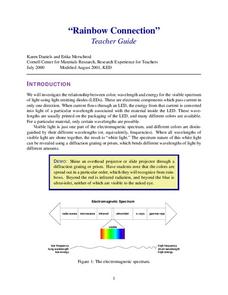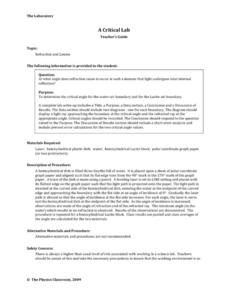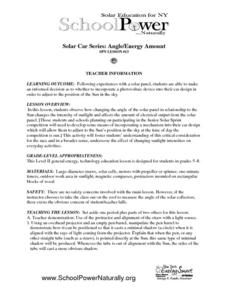Alabama Learning Exchange
Mirror, Mirror on the Wall: Reflections of Light
Why can we see our reflection in a window but not a brick wall? Young physicists learn the Law of Reflection and various light properties that help them answer this and other questions about reflection. Use the PowerPoint to introduce...
Curated OER
Refraction B2—When is Light Reflected Internally?
Physics is phun in this instructional activity. Young physicists use a lightbox to test how and where light is refracted and reflected as it travels through transparent materials. Angles of incidence and refraction, sine of both...
Curated OER
Light and Water
Third graders experiment with coins and water to explore light rays. In this light and water lesson, 3rd graders work in pairs to observe what happens with a coin in water or how it appears based on the density of the water....
Cornell University
Diffraction Demystified
Study diffraction patterns using CDs and DVDs! Scholars measure the diffraction patterns of a light wave as it hits a CD or DVD. Using the information, they can measure the distance between the tracks.
Cornell University
LEDs Rainbow Connection
View LED lights through the eyes of a scientist. Young scholars learn to view light as a wave frequency and connect various frequencies to different colors on the light spectrum. A lab activity asks groups to measure the frequency of...
Physics Classroom
A Critical Lab
Physics lab groups finagle with laser lights to determine the critical angle of refraction for both water and Lucite. Because there are no detailed steps or an answer key for this enlightening exercise, an inexperienced physics...
Curated OER
Light
Students examine how light waves travel. In this properties of light lesson, students observe how light travels in water, how light is reflected and refracted, and how light is pure energy.
Curated OER
You Light Up My Life
Students examine the relationship between solar activity and the Earth's geomagnetic field in producing the phenomena known as aurora borealis (Northern Lights) by reading and discussing "Earth, Wind and Fireworks." students graph data...
Curated OER
Electromagnetic Energy and Its Spectrum
Your older elementary students investigate electromagnetic energy and the electromagnetic spectrum. They will observe 7 items represented in the electromagnetic spectrum and make a poster of all the things the items have in common. After...
Curated OER
Why is The Sky Blue?
Learners explore why the sky is blue. In this light lesson, students conduct an experiment using water, flashlights, and milk to test why the sky is blue. Learners view a PowerPoint, take notes on their results and draw conclusions.
Curated OER
Incoming Solar Radiation
Demonstrate how the spherical shape of the Earth contributes to unequal heating of its surface and results in varying climates at different latitudes. This would be an illuminating addition to your meteorology lessons, especially when...
Curated OER
Solar Car Series: Angle/Energy Amount
Does the angle of a solar panel change the output? Emerging engineers find out! Demonstrate for your class how they can angle a straw to match the angle of light rays coming from a source. Then turn them loose to experiment with the...
Curated OER
REFLECTIONS OF SCIENCE
Students discover the different types of mirrors, their properties and some of their applications. They have already been introduced to some of the properties of light and have already experienced some of the different types of mirrors...
Curated OER
UV Rays, sunscreen effectiveness
Students identify and define that invisible UV rays can be harmful. Then they explore the effects of UV radiation on objects that react UV rays and what products are most effective in blocking UV rays. Students also make predictions...
California Academy of Science
Kinesthetic Astronomy: Longer Days, Shorter Nights
A lamp, four globes, and some signs taped around the room are all you need to set up a solar system simulation for teaching how Earth's tilted axis creates the seasons. (Sticky dots are also needed, but not mentioned in the materials...
Curated OER
X-rays
Pupils examine chest x-rays of adults and students and learn what an X-ray illustrates. They also explore the limitations to X-ray technology for use in diagnosing heart and lung ailments.
Curated OER
X-ray Spectroscopy and the Chemistry of Supernova Remnants
This link takes you to a comprehensive unit that delves into emission spectra and supernovas. There are four parts: How and where elements are created, electromagnetic radiation, spectroscopy, and the newest technology for studying our...
National Nanotechnology Infrastructure Network
Jell-O® Waveguide and Power Loss
Jell-O® can help model the transmission of light through fiber optic cables. Young scientists use the jiggly dessert to make a waveguide to transmit a laser beam from one point to another. Their models help them learn the function...
Messenger Education
Sensing the Invisible: The Herschel Experiment
The electromagnetic spectrum includes everything from very powerful gamma rays (which are used to treat cancer) to much weaker radio waves (which include microwaves). Through a hands-on activity, scholars explore the temperature...
Curated OER
Physics: Light and Sound
Young scholars explore the concepts of light waves and sound waves. In this physics lesson plan, students complete activities that require them to investigate how light and sound waves travel.
Cornell University
Building a Compound Light Microscope
What better way to learn how to use a microscope than building your own? A lab investigation has scholars use lenses from magnifying glasses and sheets of cork to design their own compound microscopes. They calculate focal length...
Wild BC
The Greenhouse Effect: The Role of CO2
Though this is meant to be second in a two-part lesson, the two are not dependent on each other. Pupils play the roles of visible light rays, light or dark surfaces, and carbon dioxide molecules. They interact and react according to...
Curated OER
Understanding Light: Lesson 2 - The Electromagnetic Spectrum
Students investigate the Electromagnetic Spectrum and realize there is energy beyond visible light. They identify parts of the EM Spectrum.
Curated OER
Me And My Shadow
Students investigate the concept of a shadow. They design a tool to create shadows for an experiment. They make observations and record the size and shape of shadows. The lesson contains background information for the teacher to deliver...























